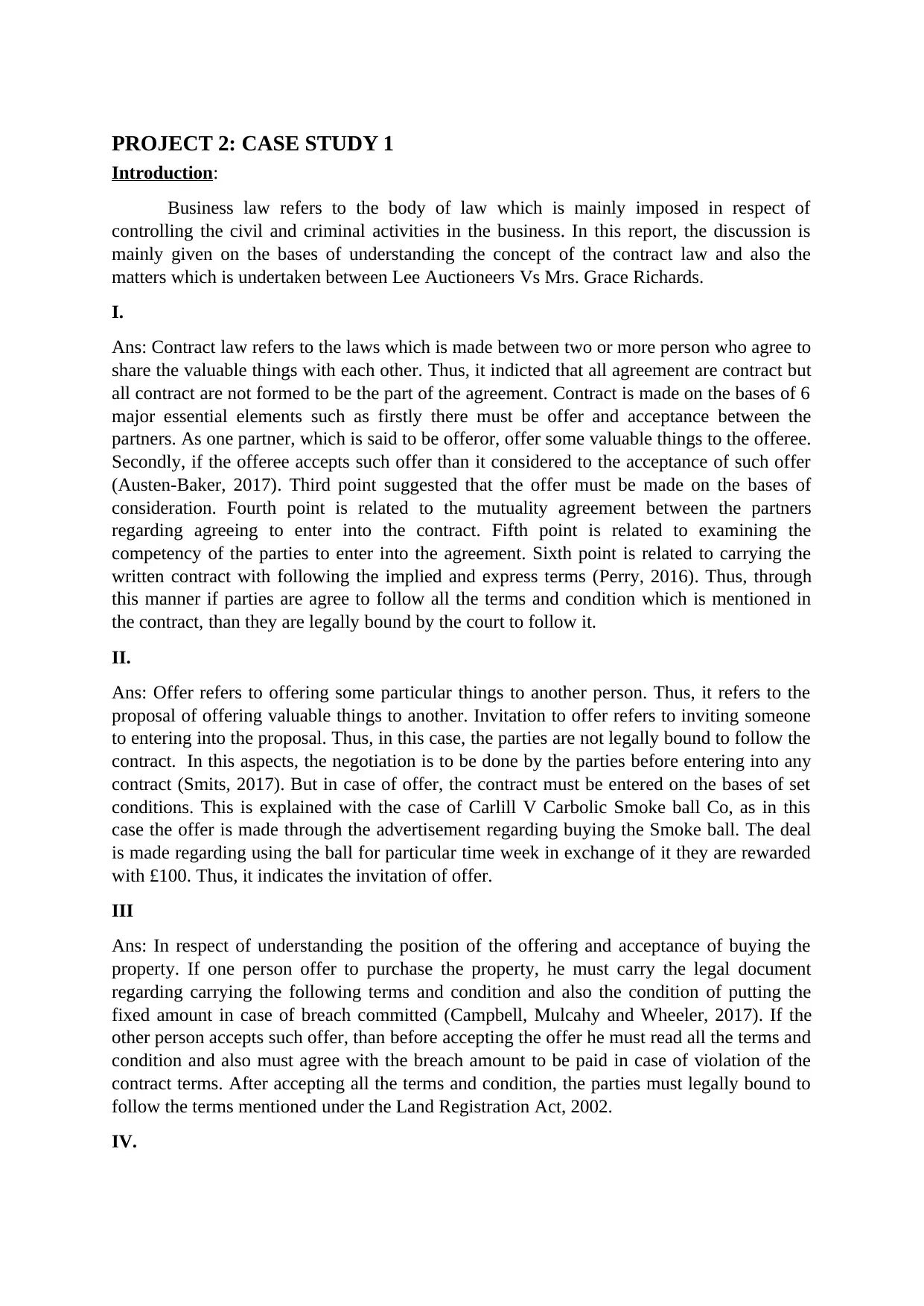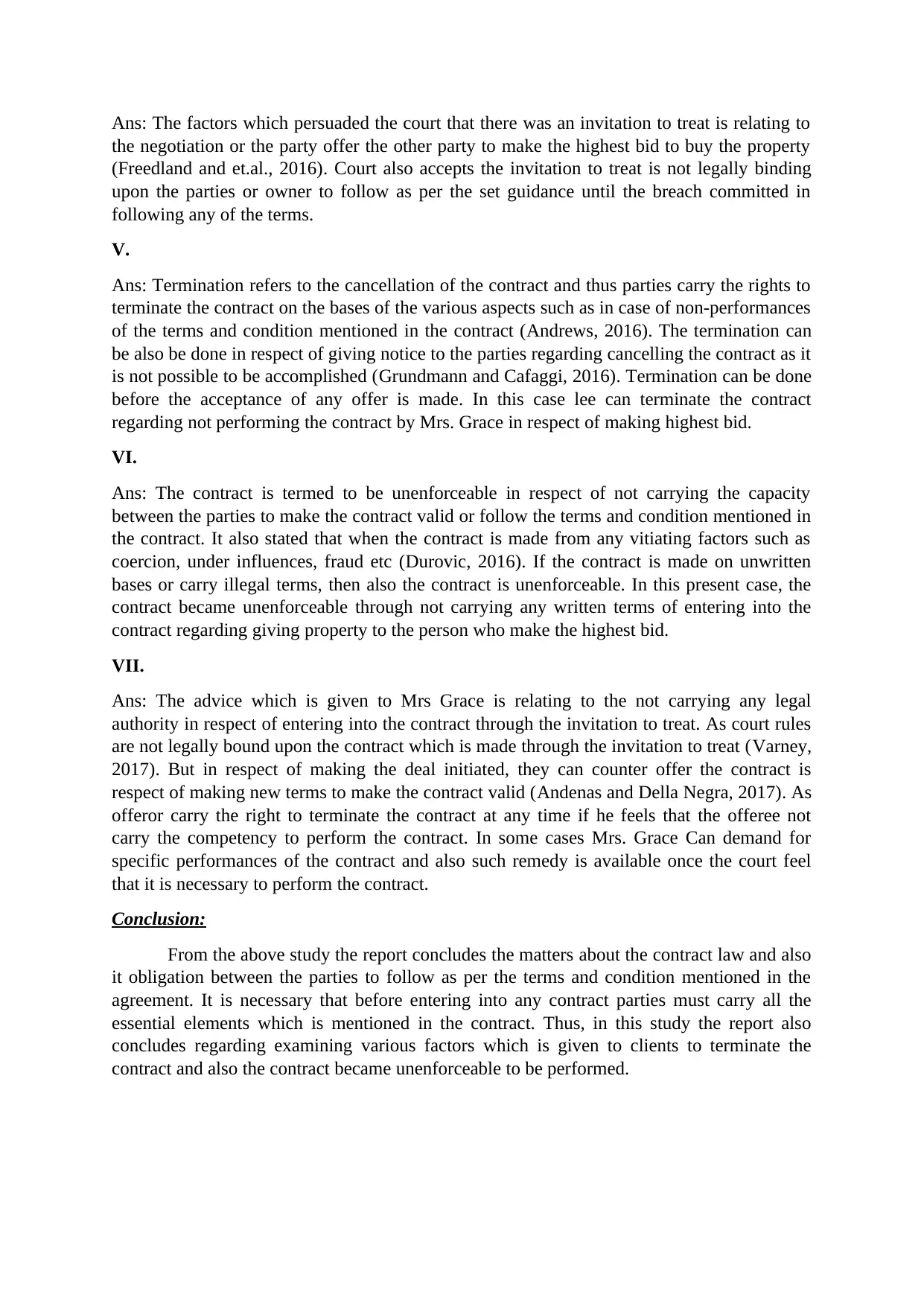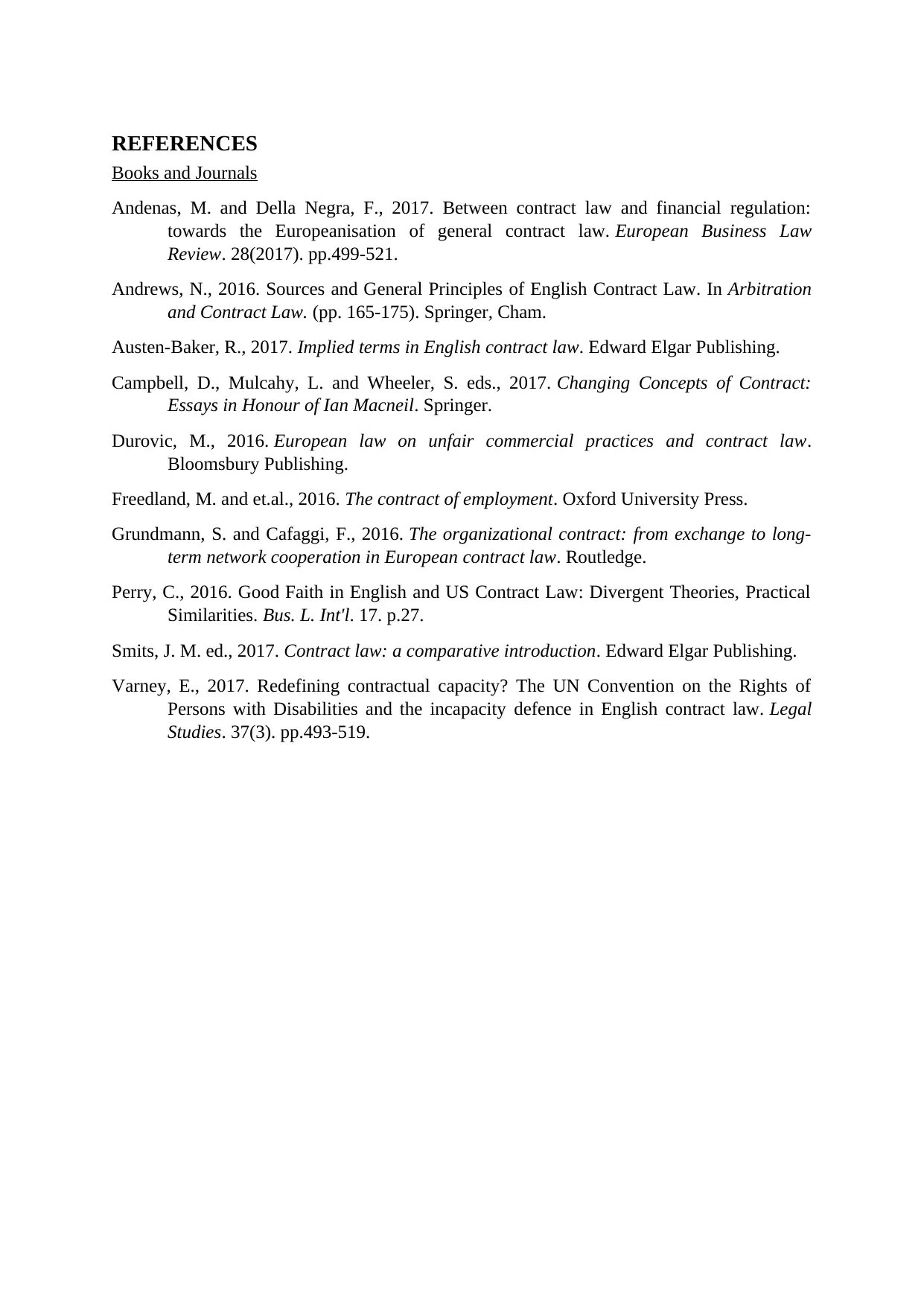Business Law Assignment 2: Contract Law Case Study Analysis
VerifiedAdded on 2023/01/11
|5
|1434
|67
Case Study
AI Summary
This case study analyzes a business law scenario involving Lee Auctioneers and Mrs. Grace Richards, focusing on contract law principles. The assignment delves into the essential elements of a contract, including offer and acceptance, and explores the concept of invitation to treat within the context of an auction. It examines the legal implications of Mrs. Richards' bid, the auctioneer's refusal, and the potential for contract termination and unenforceability. The analysis considers factors that influenced the court's perspective, the rights of the parties, and advice given to Mrs. Grace regarding her legal position. The study covers the Land Registration Act, 2002, and various aspects related to contract validity and breach, offering a comprehensive understanding of contract law application in a business environment. The assignment concludes with advice to Mrs. Grace and a review of the circumstances under which a contract can be unenforceable.

BUSINESS LAW
Paraphrase This Document
Need a fresh take? Get an instant paraphrase of this document with our AI Paraphraser

Contents
PROJECT 2: CASE STUDY 1..............................................................................................................3
REFERENCES......................................................................................................................................5
PROJECT 2: CASE STUDY 1..............................................................................................................3
REFERENCES......................................................................................................................................5

PROJECT 2: CASE STUDY 1
Introduction:
Business law refers to the body of law which is mainly imposed in respect of
controlling the civil and criminal activities in the business. In this report, the discussion is
mainly given on the bases of understanding the concept of the contract law and also the
matters which is undertaken between Lee Auctioneers Vs Mrs. Grace Richards.
I.
Ans: Contract law refers to the laws which is made between two or more person who agree to
share the valuable things with each other. Thus, it indicted that all agreement are contract but
all contract are not formed to be the part of the agreement. Contract is made on the bases of 6
major essential elements such as firstly there must be offer and acceptance between the
partners. As one partner, which is said to be offeror, offer some valuable things to the offeree.
Secondly, if the offeree accepts such offer than it considered to the acceptance of such offer
(Austen-Baker, 2017). Third point suggested that the offer must be made on the bases of
consideration. Fourth point is related to the mutuality agreement between the partners
regarding agreeing to enter into the contract. Fifth point is related to examining the
competency of the parties to enter into the agreement. Sixth point is related to carrying the
written contract with following the implied and express terms (Perry, 2016). Thus, through
this manner if parties are agree to follow all the terms and condition which is mentioned in
the contract, than they are legally bound by the court to follow it.
II.
Ans: Offer refers to offering some particular things to another person. Thus, it refers to the
proposal of offering valuable things to another. Invitation to offer refers to inviting someone
to entering into the proposal. Thus, in this case, the parties are not legally bound to follow the
contract. In this aspects, the negotiation is to be done by the parties before entering into any
contract (Smits, 2017). But in case of offer, the contract must be entered on the bases of set
conditions. This is explained with the case of Carlill V Carbolic Smoke ball Co, as in this
case the offer is made through the advertisement regarding buying the Smoke ball. The deal
is made regarding using the ball for particular time week in exchange of it they are rewarded
with £100. Thus, it indicates the invitation of offer.
III
Ans: In respect of understanding the position of the offering and acceptance of buying the
property. If one person offer to purchase the property, he must carry the legal document
regarding carrying the following terms and condition and also the condition of putting the
fixed amount in case of breach committed (Campbell, Mulcahy and Wheeler, 2017). If the
other person accepts such offer, than before accepting the offer he must read all the terms and
condition and also must agree with the breach amount to be paid in case of violation of the
contract terms. After accepting all the terms and condition, the parties must legally bound to
follow the terms mentioned under the Land Registration Act, 2002.
IV.
Introduction:
Business law refers to the body of law which is mainly imposed in respect of
controlling the civil and criminal activities in the business. In this report, the discussion is
mainly given on the bases of understanding the concept of the contract law and also the
matters which is undertaken between Lee Auctioneers Vs Mrs. Grace Richards.
I.
Ans: Contract law refers to the laws which is made between two or more person who agree to
share the valuable things with each other. Thus, it indicted that all agreement are contract but
all contract are not formed to be the part of the agreement. Contract is made on the bases of 6
major essential elements such as firstly there must be offer and acceptance between the
partners. As one partner, which is said to be offeror, offer some valuable things to the offeree.
Secondly, if the offeree accepts such offer than it considered to the acceptance of such offer
(Austen-Baker, 2017). Third point suggested that the offer must be made on the bases of
consideration. Fourth point is related to the mutuality agreement between the partners
regarding agreeing to enter into the contract. Fifth point is related to examining the
competency of the parties to enter into the agreement. Sixth point is related to carrying the
written contract with following the implied and express terms (Perry, 2016). Thus, through
this manner if parties are agree to follow all the terms and condition which is mentioned in
the contract, than they are legally bound by the court to follow it.
II.
Ans: Offer refers to offering some particular things to another person. Thus, it refers to the
proposal of offering valuable things to another. Invitation to offer refers to inviting someone
to entering into the proposal. Thus, in this case, the parties are not legally bound to follow the
contract. In this aspects, the negotiation is to be done by the parties before entering into any
contract (Smits, 2017). But in case of offer, the contract must be entered on the bases of set
conditions. This is explained with the case of Carlill V Carbolic Smoke ball Co, as in this
case the offer is made through the advertisement regarding buying the Smoke ball. The deal
is made regarding using the ball for particular time week in exchange of it they are rewarded
with £100. Thus, it indicates the invitation of offer.
III
Ans: In respect of understanding the position of the offering and acceptance of buying the
property. If one person offer to purchase the property, he must carry the legal document
regarding carrying the following terms and condition and also the condition of putting the
fixed amount in case of breach committed (Campbell, Mulcahy and Wheeler, 2017). If the
other person accepts such offer, than before accepting the offer he must read all the terms and
condition and also must agree with the breach amount to be paid in case of violation of the
contract terms. After accepting all the terms and condition, the parties must legally bound to
follow the terms mentioned under the Land Registration Act, 2002.
IV.
⊘ This is a preview!⊘
Do you want full access?
Subscribe today to unlock all pages.

Trusted by 1+ million students worldwide

Ans: The factors which persuaded the court that there was an invitation to treat is relating to
the negotiation or the party offer the other party to make the highest bid to buy the property
(Freedland and et.al., 2016). Court also accepts the invitation to treat is not legally binding
upon the parties or owner to follow as per the set guidance until the breach committed in
following any of the terms.
V.
Ans: Termination refers to the cancellation of the contract and thus parties carry the rights to
terminate the contract on the bases of the various aspects such as in case of non-performances
of the terms and condition mentioned in the contract (Andrews, 2016). The termination can
be also be done in respect of giving notice to the parties regarding cancelling the contract as it
is not possible to be accomplished (Grundmann and Cafaggi, 2016). Termination can be done
before the acceptance of any offer is made. In this case lee can terminate the contract
regarding not performing the contract by Mrs. Grace in respect of making highest bid.
VI.
Ans: The contract is termed to be unenforceable in respect of not carrying the capacity
between the parties to make the contract valid or follow the terms and condition mentioned in
the contract. It also stated that when the contract is made from any vitiating factors such as
coercion, under influences, fraud etc (Durovic, 2016). If the contract is made on unwritten
bases or carry illegal terms, then also the contract is unenforceable. In this present case, the
contract became unenforceable through not carrying any written terms of entering into the
contract regarding giving property to the person who make the highest bid.
VII.
Ans: The advice which is given to Mrs Grace is relating to the not carrying any legal
authority in respect of entering into the contract through the invitation to treat. As court rules
are not legally bound upon the contract which is made through the invitation to treat (Varney,
2017). But in respect of making the deal initiated, they can counter offer the contract is
respect of making new terms to make the contract valid (Andenas and Della Negra, 2017). As
offeror carry the right to terminate the contract at any time if he feels that the offeree not
carry the competency to perform the contract. In some cases Mrs. Grace Can demand for
specific performances of the contract and also such remedy is available once the court feel
that it is necessary to perform the contract.
Conclusion:
From the above study the report concludes the matters about the contract law and also
it obligation between the parties to follow as per the terms and condition mentioned in the
agreement. It is necessary that before entering into any contract parties must carry all the
essential elements which is mentioned in the contract. Thus, in this study the report also
concludes regarding examining various factors which is given to clients to terminate the
contract and also the contract became unenforceable to be performed.
the negotiation or the party offer the other party to make the highest bid to buy the property
(Freedland and et.al., 2016). Court also accepts the invitation to treat is not legally binding
upon the parties or owner to follow as per the set guidance until the breach committed in
following any of the terms.
V.
Ans: Termination refers to the cancellation of the contract and thus parties carry the rights to
terminate the contract on the bases of the various aspects such as in case of non-performances
of the terms and condition mentioned in the contract (Andrews, 2016). The termination can
be also be done in respect of giving notice to the parties regarding cancelling the contract as it
is not possible to be accomplished (Grundmann and Cafaggi, 2016). Termination can be done
before the acceptance of any offer is made. In this case lee can terminate the contract
regarding not performing the contract by Mrs. Grace in respect of making highest bid.
VI.
Ans: The contract is termed to be unenforceable in respect of not carrying the capacity
between the parties to make the contract valid or follow the terms and condition mentioned in
the contract. It also stated that when the contract is made from any vitiating factors such as
coercion, under influences, fraud etc (Durovic, 2016). If the contract is made on unwritten
bases or carry illegal terms, then also the contract is unenforceable. In this present case, the
contract became unenforceable through not carrying any written terms of entering into the
contract regarding giving property to the person who make the highest bid.
VII.
Ans: The advice which is given to Mrs Grace is relating to the not carrying any legal
authority in respect of entering into the contract through the invitation to treat. As court rules
are not legally bound upon the contract which is made through the invitation to treat (Varney,
2017). But in respect of making the deal initiated, they can counter offer the contract is
respect of making new terms to make the contract valid (Andenas and Della Negra, 2017). As
offeror carry the right to terminate the contract at any time if he feels that the offeree not
carry the competency to perform the contract. In some cases Mrs. Grace Can demand for
specific performances of the contract and also such remedy is available once the court feel
that it is necessary to perform the contract.
Conclusion:
From the above study the report concludes the matters about the contract law and also
it obligation between the parties to follow as per the terms and condition mentioned in the
agreement. It is necessary that before entering into any contract parties must carry all the
essential elements which is mentioned in the contract. Thus, in this study the report also
concludes regarding examining various factors which is given to clients to terminate the
contract and also the contract became unenforceable to be performed.
Paraphrase This Document
Need a fresh take? Get an instant paraphrase of this document with our AI Paraphraser

REFERENCES
Books and Journals
Andenas, M. and Della Negra, F., 2017. Between contract law and financial regulation:
towards the Europeanisation of general contract law. European Business Law
Review. 28(2017). pp.499-521.
Andrews, N., 2016. Sources and General Principles of English Contract Law. In Arbitration
and Contract Law. (pp. 165-175). Springer, Cham.
Austen-Baker, R., 2017. Implied terms in English contract law. Edward Elgar Publishing.
Campbell, D., Mulcahy, L. and Wheeler, S. eds., 2017. Changing Concepts of Contract:
Essays in Honour of Ian Macneil. Springer.
Durovic, M., 2016. European law on unfair commercial practices and contract law.
Bloomsbury Publishing.
Freedland, M. and et.al., 2016. The contract of employment. Oxford University Press.
Grundmann, S. and Cafaggi, F., 2016. The organizational contract: from exchange to long-
term network cooperation in European contract law. Routledge.
Perry, C., 2016. Good Faith in English and US Contract Law: Divergent Theories, Practical
Similarities. Bus. L. Int'l. 17. p.27.
Smits, J. M. ed., 2017. Contract law: a comparative introduction. Edward Elgar Publishing.
Varney, E., 2017. Redefining contractual capacity? The UN Convention on the Rights of
Persons with Disabilities and the incapacity defence in English contract law. Legal
Studies. 37(3). pp.493-519.
Books and Journals
Andenas, M. and Della Negra, F., 2017. Between contract law and financial regulation:
towards the Europeanisation of general contract law. European Business Law
Review. 28(2017). pp.499-521.
Andrews, N., 2016. Sources and General Principles of English Contract Law. In Arbitration
and Contract Law. (pp. 165-175). Springer, Cham.
Austen-Baker, R., 2017. Implied terms in English contract law. Edward Elgar Publishing.
Campbell, D., Mulcahy, L. and Wheeler, S. eds., 2017. Changing Concepts of Contract:
Essays in Honour of Ian Macneil. Springer.
Durovic, M., 2016. European law on unfair commercial practices and contract law.
Bloomsbury Publishing.
Freedland, M. and et.al., 2016. The contract of employment. Oxford University Press.
Grundmann, S. and Cafaggi, F., 2016. The organizational contract: from exchange to long-
term network cooperation in European contract law. Routledge.
Perry, C., 2016. Good Faith in English and US Contract Law: Divergent Theories, Practical
Similarities. Bus. L. Int'l. 17. p.27.
Smits, J. M. ed., 2017. Contract law: a comparative introduction. Edward Elgar Publishing.
Varney, E., 2017. Redefining contractual capacity? The UN Convention on the Rights of
Persons with Disabilities and the incapacity defence in English contract law. Legal
Studies. 37(3). pp.493-519.
1 out of 5
Related Documents
Your All-in-One AI-Powered Toolkit for Academic Success.
+13062052269
info@desklib.com
Available 24*7 on WhatsApp / Email
![[object Object]](/_next/static/media/star-bottom.7253800d.svg)
Unlock your academic potential
Copyright © 2020–2026 A2Z Services. All Rights Reserved. Developed and managed by ZUCOL.





